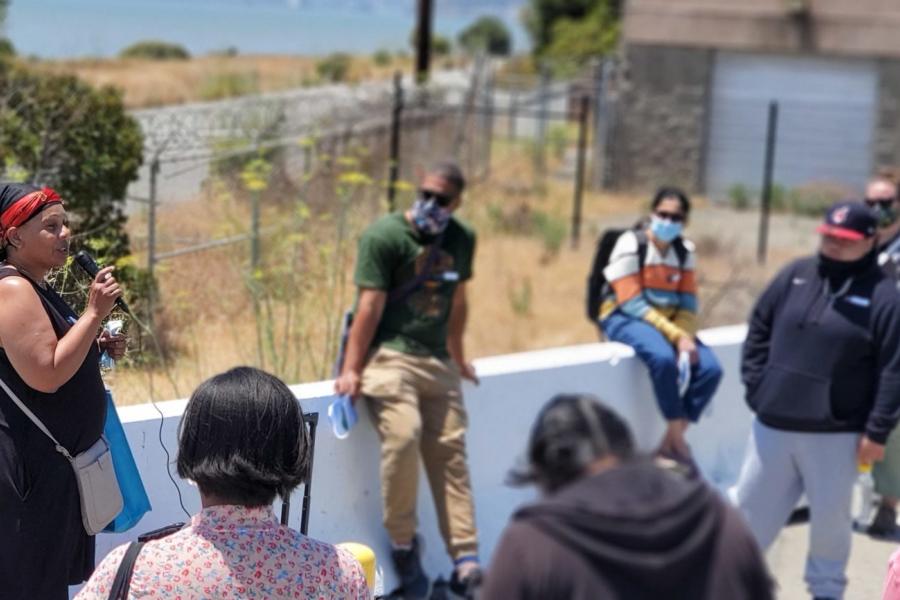Oakland Shoreline Leadership Academy Project

Oakland shoreline, Alameda; Measure AA Region: East Bay
Safe, Clean Water and Pollution Prevention Program; Vital Fish, Bird and Wildlife Habitat Program; Integrated Flood Protection Program; Shoreline Public Access Program.
Port of Oakland, BCDC, and San Francisco Estuary Institute (SFEI)
UPDATE 2022: Grantee West Oakland Environmental Indicators Project finished the Oakland Shoreline Leadership Academy and wrapped up the grant in June 2022. Program participants spent six months exploring the intersection of environmental and social needs of their communities and developed numerous project ideas for the Oakland shoreline related to habitat restoration, environmental education and storytelling, and more.
***
A grant of $180,000 to West Oakland Environmental Indicators Project to host the Shoreline Leadership Academy, a community-led shoreline habitat restoration planning process in Alameda County and to provide local residents from economically disadvantaged communities information and training to enable them to meaningfully engage in the planning process.
The Shoreline Leadership Academy will educate a cohort of local residents about environmental and social issues along the Oakland shoreline and host a community-led planning process in which the cohort of residents will help to develop shoreline restoration projects in Alameda County. Oakland’s economically disadvantaged communities are on the frontline when it comes to sea level rise, flooding, toxic and hazardous waste, and other issues affecting the Oakland shoreline. Sea level rise and flooding could bring toxins into vulnerable neighborhoods and lead to increased illnesses, or could displace vulnerable shoreline communities altogether. Oakland communities, especially economically disadvantaged communities, need to be informed about these issues and engaged in creating the solutions.
The Shoreline Leadership Academy will initiate a planning process to identify and prioritize shoreline restoration projects in Alameda County; as part of this process, the Shoreline Leadership Academy will train residents of disadvantaged communities to tackle issues affecting their shoreline, and guide program participants through a community-led planning process intended to lead to implementable shoreline restoration projects.
The Shoreline Leadership Academy will be a six-month program, with participants meeting two days a month – one day consisting of educational training, and the second day consisting of community planning. The overall project has the following objectives:
- Recruit a cohort of 18 residents from economically disadvantaged communities living on or near the shoreline in Oakland to participate in the Shoreline Leadership Academy.
- Hire up to two consultants with community planning expertise (e.g., with experience in leading the East Oakland Neighborhood Initiative and the development of the Oakland Equitable Climate Action Plan), and partner with organizations (e.g., San Francisco Estuary Institute) to develop and implement a curriculum that will cover topics such as:
- Understanding San Francisco Bay shoreline ecology
- Sea level rise and toxins in the shoreline environment o Habitat restoration and public access along the shoreline
- Economic development along the shoreline
- Green infrastructure and nature-based solutions to climate change
- Communicating environmental issues to the public o Asset mapping, developing community engagement plans, and co-developing shoreline restoration projects
- Help program participants build partnerships with entities involved in shoreline restoration projects, and empower program participants to engage in and lead community planning efforts that can result in implementable shoreline habitat restoration projects.
- Guide program participants in developing a community engagement and communications strategy to educate others in their communities about relevant environmental and social issues and how they could be addressed through shoreline restoration projects.
- Invite project managers of one or more shoreline habitat and public access project planning efforts to present to program participants; guide participants in providing comments on the planning documents or providing recommendations on how to effectively engage frontline communities in the design and implementation of the project(s).
- Facilitate collaboration between program participants and partner entities to fundraise or apply for grants to move individual project ideas forward into planning, design, and implementation phases.
